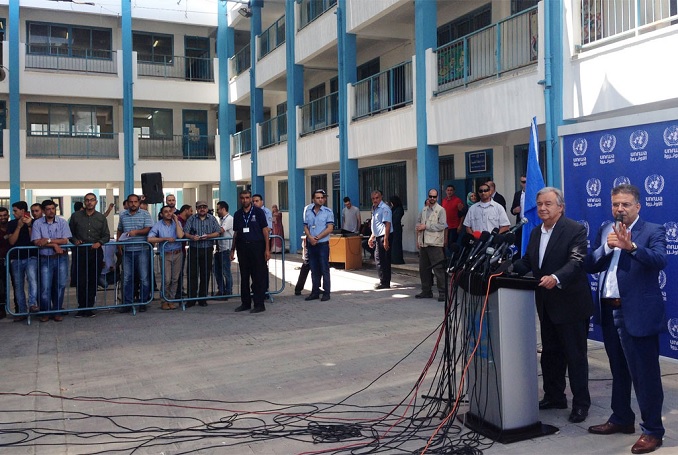
By Ramona Wadi
As always, UN officials take pride in pontificating about Palestine. UN Secretary-General Antonio Guterres has proved to be no exception, faithfully pursuing the same agenda which resulted in Palestinians becoming a marginalized subject of discussion. Israel may complain of rhetorical visibility allocated to Palestine at the UN, however, it is this tactic which allows Israeli violations to continue unhindered.
International committees, agencies, meetings and resolutions have placed an irreparable burden upon Palestinians, resulting in extreme political isolation. Sometimes, this isolation is publicly voiced, albeit without the desire to allow Palestinians to reclaim their rights to territory and return.
In his address to the Committee on the Exercise of the Inalienable Rights of the Palestinian People, Guterres spoke a sliver of truth: “As we all know, the question of Palestine is inextricably linked with the history of United Nations and is one of the longest unresolved issues on our agenda.” Lest a sliver of false hope is ignited, Guterres reiterated that there is no “plan B” to the two-state compromise. His ending remarks comprise of: “A two-state solution is the only way to achieve the inalienable rights of the Palestinian people and secure a sustainable solution to the conflict.”
Besides the tedious regurgitation of the usual summary which even refrains from attributing colonial expansion directly to Israel, anyone reading or listening to Guterres’ address would have benefited from an acknowledgement that the colonization of Palestine was aided by collusion and incompetence on behalf of the organisation claiming to protect human rights. It is unacceptable that the UN maintains its façade of responsibility for human rights when it thrives upon allowing its influential members to break international law with impunity.
The constant appropriation of Palestinian voices through international institutions has not ceased. It is following the designated trajectory set in the early years of the UN, as Guterres has pointed out in his generalized statements. Placing his statement within context, one such example of Palestinian absence can be found in the intervention by the Guatemalan Ambassador to the UN in 1947 when the Partition Plan which paved the way for the colonization of historic Palestine was being debated. The words uttered by Jose Garcia Granados: “An ignorant majority should not be allowed to impose its will. A million progressive human beings should not be the plaything of a few ringleaders supported by millions of human beings of less advanced ideas,” summarize the UN’s perpetual attitude towards oppressed populations.
Decades later, the colonisers, supported by the UN, have flaunted their purported superiority by massacres, displacement and dispossession of Palestinians while the organisation exploits every life lost through aggression committed by Israel, to create a spectacle out of the colonised. It is puerile to assume that just because the UN regularly debates Palestine; it is a proponent of Palestinian rights.
Palestinian absence has become a requirement in discourse regarding Palestine. Guterres could have substituted his entire speech by publicly asserting that every international action, rhetorical or otherwise, constitutes a collaborative approach towards colonizing more Palestinian territory. The UN is well aware of the fact that absence is not equivalent to meaningless. Pursuing such duplicity at the expense of Palestinian lives makes an update on the UN’s motives a prerequisite.
– Ramona Wadi is a staff writer for Middle East Monitor, where this article was originally published. She contributed this article to PalestineChronicle.com.




